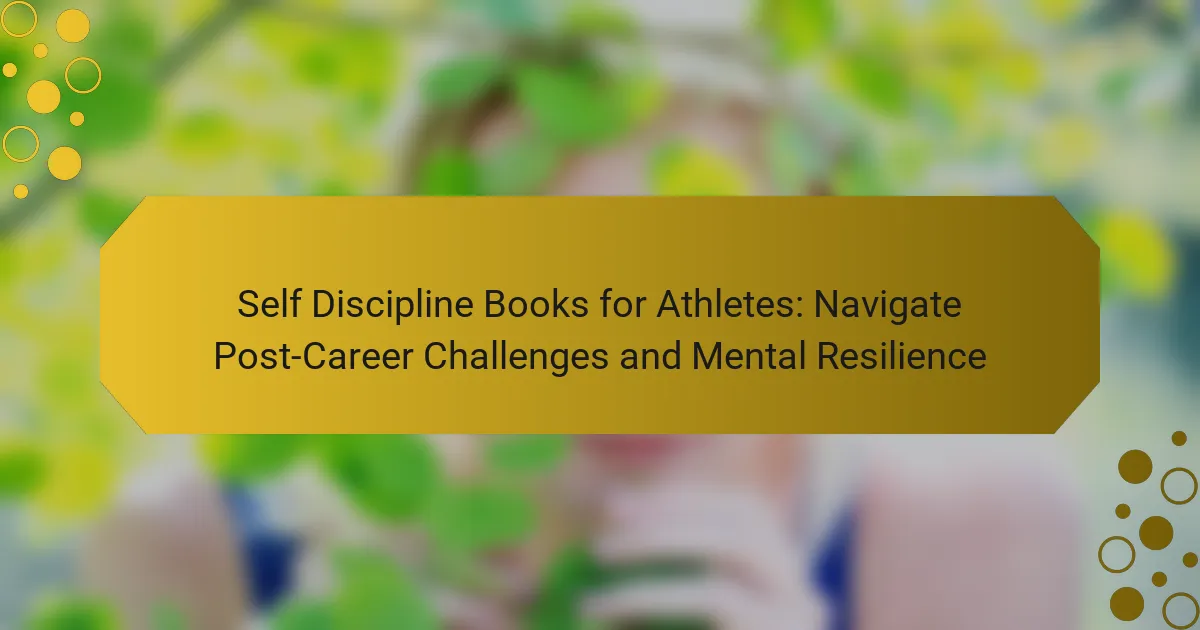Self-discipline books offer athletes essential strategies for managing post-career challenges and enhancing mental resilience. These resources focus on goal setting, stress management, and self-reflection. They provide unique insights into maintaining a structured routine and adapting to new identities. Additionally, these books include personalized coaching insights and practical steps for implementing lessons into daily life.

How Can Self Discipline Books Aid Athletes in Post-Career Transition?
Self-discipline books significantly aid athletes in post-career transitions by enhancing mental resilience. These resources provide strategies to manage life changes and maintain focus. They often include techniques for goal setting, stress management, and self-reflection, which are crucial during this challenging period. Athletes can develop a growth mindset, enabling them to adapt to new identities beyond sports. Moreover, studies indicate that disciplined practices foster emotional well-being, helping former athletes navigate uncertainty effectively.
What are the key themes in self discipline literature for athletes?
Self discipline literature for athletes emphasizes mental resilience, focus, and overcoming post-career challenges. Key themes include the development of consistent habits, goal setting, and the importance of accountability. These elements foster a mindset that supports sustained performance and personal growth. Additionally, many books highlight the role of mental toughness in navigating transitions and maintaining motivation after athletic careers end.
Which authors are most influential in this niche?
Several authors significantly influence self-discipline literature for athletes. Notable names include Brian Tracy, whose book “Eat That Frog!” emphasizes prioritization; Angela Duckworth, known for “Grit,” which highlights perseverance; and Tim Ferriss, author of “The 4-Hour Workweek,” focusing on efficiency. These works provide valuable insights into mental resilience and navigating post-career challenges.
What are the core philosophies presented by these authors?
The core philosophies presented by authors of self-discipline books for athletes focus on mental resilience, goal setting, and coping strategies. These philosophies emphasize the importance of maintaining discipline post-career, fostering a growth mindset, and developing emotional intelligence. Techniques such as visualization and routine building are often highlighted as essential tools for navigating challenges. Ultimately, these philosophies aim to empower athletes to adapt and thrive beyond their competitive years.
How do self discipline books address mental health challenges for retired athletes?
Self-discipline books help retired athletes manage mental health challenges by providing strategies for resilience and self-reflection. These books often address issues like identity loss and depression, common among athletes post-career. They offer practical exercises that enhance mental fortitude, promote goal-setting, and encourage a proactive mindset. For example, studies show that structured routines can significantly improve mental well-being. By focusing on personal growth, these resources empower athletes to navigate life’s transitions effectively.
What strategies do these books recommend for resilience?
Self-discipline books for athletes recommend strategies like goal-setting, mindfulness practices, and building a support network to enhance resilience. These methods help in managing stress and adapting to post-career transitions effectively. Goal-setting provides clear direction, while mindfulness fosters mental clarity. A strong support network offers emotional backing during challenging times.
How do they tackle identity loss after sports?
Self-discipline books for athletes provide practical strategies to navigate identity loss after sports. These resources emphasize mental resilience, helping former athletes redefine their self-worth beyond competitive achievements. Techniques include goal-setting, mindfulness practices, and building a supportive network. Engaging with these materials fosters a proactive approach to personal growth, enhancing emotional well-being during transitions.

What Unique Insights Do Self Discipline Books Offer for Mental Resilience?
Self-discipline books provide athletes with unique insights into mental resilience by offering strategies for coping with post-career challenges. These books emphasize the importance of maintaining a structured routine, which can help athletes transition smoothly into new life phases. Techniques such as goal setting and self-reflection are highlighted, enabling individuals to harness their competitive mindset for personal growth. Additionally, these resources often share personal stories of resilience, illustrating how discipline can lead to mental fortitude in adversity.
How do these books differentiate themselves from general self-help literature?
Self-discipline books for athletes stand out from general self-help literature by focusing on unique challenges faced during and after sports careers. These books address mental resilience specifically tailored to athletes, providing strategies to navigate identity shifts and emotional struggles post-retirement. Unlike broader self-help titles, they incorporate sport-specific experiences and insights from elite athletes. This targeted approach equips readers with practical tools and techniques to maintain discipline and motivation, emphasizing the importance of mental strength in both sports and life transitions.
What unique case studies are presented?
Self-discipline books for athletes often feature unique case studies that illustrate post-career challenges and mental resilience. One notable case study is that of a retired Olympic athlete who faced identity loss after competition ended. This athlete utilized techniques from self-discipline literature to rebuild confidence and establish a new career. Another example includes a professional football player who applied principles from these books to manage stress and anxiety during transitions, highlighting the effectiveness of structured routines. Such case studies reinforce the practical application of self-discipline principles in real-life scenarios, showcasing their impact on mental health and personal development.
What exercises or practices are suggested for athletes?
Self-discipline is crucial for athletes to navigate post-career challenges and enhance mental resilience. Suggested exercises include mindfulness meditation, which improves focus and emotional regulation, and goal-setting practices that foster commitment and accountability. Strength training can also be beneficial, as it builds physical resilience and boosts confidence. Journaling is another effective practice, helping athletes reflect on their experiences and maintain a growth mindset. Regularly engaging in these exercises cultivates the discipline necessary for long-term success and well-being.
How can these practices be integrated into daily life?
Integrating self-discipline practices into daily life enhances mental resilience for athletes transitioning post-career. Start by setting clear, achievable goals that align with personal values. Establish a daily routine that incorporates physical activity, mindfulness, and reflection. Use techniques from self-discipline books, such as visualization and accountability, to reinforce commitments. Regularly assess progress and adapt strategies to maintain motivation and focus.

What are the Rare Attributes of Self Discipline Books for Athletes?
Self-discipline books for athletes often include rare attributes that enhance their effectiveness in addressing post-career challenges and mental resilience. These attributes may include personalized coaching insights, unique mental training techniques, integration of sports psychology principles, and case studies from elite athletes. Additionally, they may offer unconventional strategies for maintaining discipline after retirement, such as mindfulness practices and community engagement approaches. These rare attributes provide athletes with specialized tools to navigate their transitions effectively.
Which lesser-known authors provide niche perspectives?
Lesser-known authors like Steven Pressfield and Dan Millman offer unique insights into self-discipline for athletes. Pressfield’s “The War of Art” explores overcoming internal resistance, while Millman’s “Way of the Peaceful Warrior” emphasizes mental resilience. Both authors provide niche perspectives that cater to athletes navigating post-career challenges. Their works focus on cultivating discipline and mental strength, essential for sustaining success beyond sports.
What unconventional methods do they propose?
Self-discipline books for athletes often propose unconventional methods such as mindfulness practices, visualization techniques, and unconventional goal-setting strategies. These approaches focus on enhancing mental resilience and adapting to post-career challenges. For instance, mindfulness can improve emotional regulation, while visualization aids in maintaining motivation. Additionally, setting unconventional goals, like focusing on personal growth rather than performance metrics, can provide a fresh perspective for athletes transitioning into new phases of life.
How do these books incorporate sport-specific experiences?
Self-discipline books for athletes incorporate sport-specific experiences by providing relatable narratives and practical strategies. These books often feature real-life examples from renowned athletes, illustrating their personal journeys through challenges. Such narratives foster mental resilience, emphasizing the importance of discipline in both sports and post-career life. Additionally, they offer techniques tailored to athletes, such as visualization and goal-setting, which enhance performance and adaptability in new environments. This unique attribute of combining personal anecdotes with actionable advice makes these books particularly valuable for athletes navigating their transitions.

What are the Practical Steps for Implementing Lessons from These Books?
To implement lessons from self-discipline books for athletes, follow these practical steps. Start by identifying key principles from the books that resonate with your post-career challenges and mental resilience. Next, create a structured plan to integrate these principles into your daily routine, focusing on consistency and accountability. Engage with a support network, such as fellow athletes or coaches, to share experiences and strategies. Finally, regularly assess your progress and adjust your approach based on what works best for your unique situation.
What are the best practices for athletes to maintain discipline post-career?
Athletes can maintain discipline post-career by adopting structured routines, setting new goals, and utilizing self-discipline books. These resources enhance mental resilience and provide strategies for navigating life transitions. Engaging in regular physical activity and seeking mentorship also supports discipline. Additionally, practicing mindfulness can improve focus and decision-making.
What common mistakes should athletes avoid when applying these principles?
Athletes should avoid several common mistakes when applying self-discipline principles. First, neglecting mental resilience training can lead to burnout. Second, failing to set clear, achievable goals can diminish motivation. Third, ignoring the importance of recovery may hinder performance. Lastly, not seeking support from mentors or peers can isolate athletes during transitions.
How can athletes create a personal development plan based on these insights?
Athletes can create a personal development plan by integrating insights from self-discipline books. First, identify core values and goals that align with post-career aspirations. Next, assess mental resilience strategies presented in these books to enhance coping mechanisms. Incorporate actionable steps, such as setting specific, measurable, achievable, relevant, and time-bound (SMART) objectives. Regularly review progress and adjust the plan based on evolving needs and insights gained from ongoing reading and reflection. This structured approach fosters growth and prepares athletes for life beyond sports.
